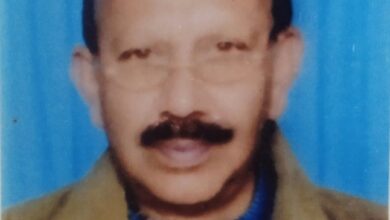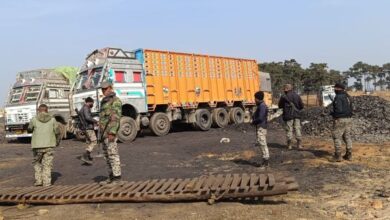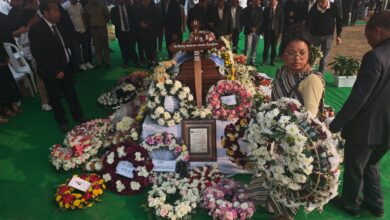
Shillong,June 7: Over 60 Dorbar Shnongs of greater Shillong have decided to constitute the village defence parties (VDPs) for assisting the government to address the drug issue.
The traditional institutions have also been asked to submit their suggestions on the proposed amendment of The Meghalaya Village Defence Organisation Rules, 2008 within three weeks to one month.
This was decided at a consultative meeting chaired by the Social Welfare Minister Paul Lyngdoh on anti-drugs initiatives and constitution of the VDPs with MLAs, MDCs and the traditonal heads.
Speaking to reporters, Lyngdoh said, “The first initiative that the various stakeholders have agreed upon is the reconstitution of VDP, which has been active in combating crimes especially in rural areas but in the context of controlling drugs and the spread of narcotic, today we have decided that various dorbar shnongs would prepare themselves to constitute these VDPs.”
“To begin with we have to start by revisiting the various rules that were last framed in 2008, so it has been a long time gap and we would certainly need to update those rules in view of growing and changing challenges. So we have clearly taken the inputs from the dorbars and indicated a timeline of 3 weeks to a month within which they will submit the various proposals for the amendment of the rules,” he said.
Lyngdoh said once those amendments are agreed upon, the various dorbar shnongs will start organising the VDPs, which will assist the home police and also the government in combating the drug menace at the locality and grassroot level.
The minister said, “We will be revisiting those rules. We will ensure these VDPs become the foot soldiers of the law enforcing agencies and together they will assist us in identifying especially in hotspots potential drug traffickers and with their support, we should be able to eradicate the menace from Meghalaya.”
“We will be receiving suggestions from the dorbar shnongs and we will then familiarise them with the basic amenities, facilities and training that is required. We will also familiarise them with the basic rules that govern the function of VDPs and also the laws of the land that govern the control and reduction of drugs and narcotics,” he said.
“I have been advocating a community oriented approach and today the participation of so many dorbar shnongs is proof that they have faith in what we are trying to achieve and I am very happy with the outcome of the meeting,” Lyngdoh said.
It was also decided that copies of the latest laws and rules like the PITNDPS will be circulated to the dorbar shnongs for their views, opinions and suggestions on improving those rules.
“We have also decided that elected representatives, MLAs and MDCs of entire state beginning with this exercise which we started today will be covered because we would like the convergence mode to ensure the success of the DREAM project,” he said.
Earlier during the consultative meeting, an interactive session took place where concerns from the dorbars were voiced, and queries were raised. A notable recommendation came
from M. Kharkrang, Retd IPS, Headman of Durbar Shnong ,Riatsamthiah regarding the need for stricter enforcement measures as he drew from previous experiences in combating illicit liquor smuggling, emphasizing the importance of collaboration between law enforcement agencies and the judiciary. Another suggestion involved improving witness cooperation by fostering closer collaboration between the police department and local communities which is critical to achieve successful prosecution.
Sampath Kumar, Principal Secretary & Development Commissioner, Social
Welfare Department emphasized the importance of empathetic and sensitive approach to help individuals reintegrate back into society.
He highlighted that many individuals struggling with substance abuse can recover
with the right support and that it is crucial not to stigmatize them but to provide the
necessary assistance for their rehabilitation and reintegration into society. As part of
the lifecycle approach, he stressed that early childhood, particularly from zero to
eight years, is a critical stage where investing time and guidance ensures that
children do well later in life. Whereas, during adolescence, substantial support is
required and focusing on youth and adulthood is as essential to tackling the root of
substance abuse issues in the state.
During the meeting, it was also highlighted that communities will take the initiative
to set up VDPs in their respective localities, with guidance and training provided by
the DREAM Mission. There was a request for additional rehabilitation centers
in communities, similar to the initiative undertaken by the Mawlai town dorbar, that
will be supported by the DREAM Mission. The state government will introduce
revised VDP rules to ensure more ownership and responsibility within the
community, aimed at facilitating greater community involvement and
empowerment.
Vivek Syiem, IPS, Special Superintendent of Police (CID) delivered insightful perspectives on the role of VDPs in combating drug-related
issues. He emphasized the collaborative efforts between VDPs and law enforcement
agencies, shedding light on the region’s drug-related challenges. His presentation
delved into the surge in drug cases since 2018, with a focus on increased seizures and
the hurdles posed by new psychoactive substances. Furthermore, it underscored
VDPs’ role as frontline responders in emergencies, stressing their significance in
crime prevention and public safety.
Dr. Bethabara Decruse, Project Director of the Meghalaya AIDS Control Society,
presented data indicating that the HIV prevalence in Meghalaya is 0.39%, surpassing
the national average of 0.2%.
This initiative is part of the Drug Reduction Elimination & Action Mission (DREAM) launched in June 2023– a targeted mission to build a “Drug Free Meghalaya” that deploys a multifaceted coordinated strategy that leverages the combined efforts of the state and local communities to eliminate the incidence of substance use in the state.
The consultative meeting also witnessed the presence of Shakil P. Ahammed, Additional Chief Secretary, I. W. Ingty, Secretary, Social Welfare Department and Idashisha Nongrang, Director General of Police, Meghalaya among others.





